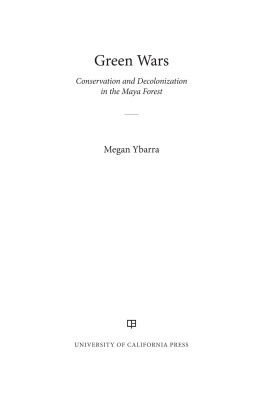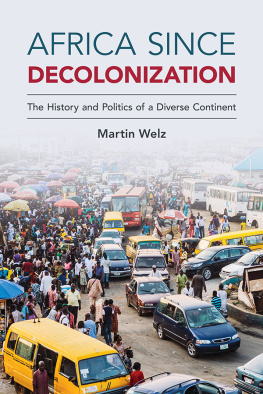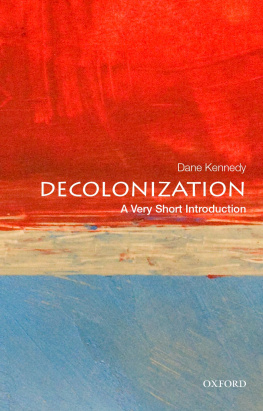DECOLONIZATION AND THE DECOLONIZED
WORKS BY ALBERT MEMMI
Contre-courants
Agar, un roman
The Colonizer and the Colonized
Dependence: A Sketch for a Portrait of the Dependent
Dominated Man: Notes toward a Portrait
The Pillar of Salt
Portrait of a Jew
Racism
The Scorpion; or, The Imaginary Confession
ALBERT MEMMI
Decolonization and the Decolonized
Translated by Robert Bononno

The University of Minnesota Press gratefully acknowledges financial assistance for the translation of this book provided by the French Ministry of CultureCentre national du livre. Ouvrage publi avec le concours du Ministre franais charg de la cultureCentre national du Livre.
First published in France as Portrait du dcolonis: arabo-musulman et de quelques autres, copyright 2004 ditions Gallimard, Paris.
Copyright 2006 by Robert Bononno
All rights reserved. No part of this publication may be reproduced, stored in a retrieval system, or transmitted, in any form or by any means, electronic, mechanical, photocopying, recording, or otherwise, without the prior written permission of the publisher.
Published by the University of Minnesota Press
111 Third Avenue South, Suite 290
Minneapolis, MN 55401-2520
http://www.upress.umn.edu
Library of Congress Cataloging-in-Publication Data
Memmi, Albert.
[Portrait du dcolonis arabo-musulman et de quelques autres. English]
Decolonization and the decolonized / Albert Memmi ; translated by Robert Bononno.
p. cm.
First published in France as Portrait du dcolonis: arabo-musulman et de quelques autres, copyright 2004 ditions Gallimard, Paris.
Includes bibliographical references.
ISBN-13: 978-0-8166-4734-7 (hc : alk. paper) ISBN-10: 0-8166-4734-8 (hc : alk. paper)
ISBN-13: 978-0-8166-4735-4 (pb : alk. paper) ISBN-10: 0-8166-4735-6 (pb : alk. paper)
1. PostcolonialismArab countries. 2. Hybridity (Social sciences)Arab countries. 3. EthnopsychologyArab countries. 4. National characteristics, Arab. 5. Arab countriesEmigration and immigration. 6. ArabsForeign countries. I. Bononno, Robert.
II. Title.
JV51.M42b 2006
325.309174927dc22 | 2006013903 |
Printed in the United States of America on acid-free paper
The University of Minnesota is an equal-opportunity educator and employer.
12 11 10 09 08 07 06 10 9 8 7 6 5 4 3 2 1
Contents
Acknowledgments
I wish to thank Agns Guy, Henri Lopes, Afifa Marzouki, Alicia Duvojn Ortiz, and Sabia Sama for their attention to those parts of the book dealing with Black Africa, the Maghreb, Latin America, and the suburban slums.
I would especially like to thank Pierre Maillot, whose friendly suggestions have been particularly useful.
Introduction
Rarely have I had so little desire to write a book. For in writing Decolonization and the Decolonized, I feared that my arguments would go unheard or be distorted, or might compound the problems faced by still fragile societies in need of our support. Nevertheless, when all was said and done, I felt there was an urgent need that formerly colonized peoples have an opportunity to hear a voice other than that of their so-called allies. When, in the 1950s, I wrote The Colonizer and the Colonized, I knew that some of my readers would refuse to follow me. Liberals, for example, like the highly esteemed Pierre Mends-France, who felt that once the necessary reforms had been established, the colonized would abandon their quest for independence; or Marxists, who claimed, as usual, that decolonization consisted primarily in economic demands. I believed they were wrong and that the situation was more complex than that. I also expected to hear from another segment of popular opinion, one that defended the endurance of colonization; but that segment, aside from its errors of judgment, I enjoyed contradicting. I consoled myself for so many potential misunderstandings by convincing myself that I would at least obtain the complete approval of the oppressed; which turned out to be the case. But in writing Decolonization and the Decolonized, I fear I have managed to annoy just about everyone. How often was it suggested to mewith a tone of irony or skepticismthat I should rather try to depict what has become of the colonized. In other words, that my efforts were misplaced. And certainly, at times, I did ask myself that very question; but this was not the source of my hesitation. It seemed to me that perhaps what was needed was to allow time to do its work.
Several decades have now passed. It is finally possible to evaluate what has been lost and gained, and possibly to draw certain conclusions for the future.
From the outset it must be acknowledged that, far from underestimating the benefits of the liberty conquered, or reconquered, by colonized peoples, it is important to emphasize all that remains to be done. National and ethnic liberation movements were legitimate and urgently needed, similar to the womens movement of today. But while we must continue to work so that all nations, young and old, all minorities finally stand as equals among equals, it is no less necessary, for that very reason, to examine why those pitched battles did not always produce the anticipated results. I concluded The Colonizer and the Colonized with the words Having re-conquered all his dimensions, the former colonized will have become a man like any other, but I also added with all the ups and downs of all men to be sure. Clearly, the downside continues to play a preponderant role.
During the first years of independence, attentive and well-meaning observers grew concerned about the persistent poverty of formerly colonized peoples. Fifty years later nothing really seems to have changed, except for the worse. Their analysis was focused primarily on Black Africa. It is now obvious that the majority of Arab-Muslim and Latin American states, including those with sufficient resources, are not doing much better. In spite of the sometimes spectacular growth of individual states, malnutrition, famine, and endless political crises also affect a number of Asian countries. Widespread corruption and tyranny and the resulting tendency to use force, the restriction of intellectual growth through the adherence to long-standing tradition, violence toward women, xenophobia, and the persecution of minoritiesthere seems to be no end to the pustulent sores weakening these young nations. Why such failures? What are the consequences on the physiognomy and behavior of the formerly colonized? These are the kinds of questions this portrait of contemporary decolonization attempts to answer.
Like The Colonizer and the Colonized, this work, which is to some extent its continuation, is neither a political tract nor a utopian dream. Except for the final pages, which examine future perspectives and are presented as a series of hypotheses, the book is an assessment of the present situation. It attempts to describe a new reality, the reality of people who were once but are no longer colonized, or nearly so, who sometimes continue to believe they are, and who are part of the unfolding drama of history.
As before, I have relied on the Arab-Muslim model, more specifically, the Maghreb. Simply because that is the region I know best, having been born and raised there, and having retained, in spite of the current difficulties, strong affiliations and friendships. And also because it presents some of the most intractable problems in the world. However, as often as possible I have made use of other experiences, and made comparisons with South America, Asia, and Black Africa in particular. I would be dishonest if I did not acknowledge that it is my hope that the majority of the decolonized recognize themselves in this portrait, at least partially.
Next page









